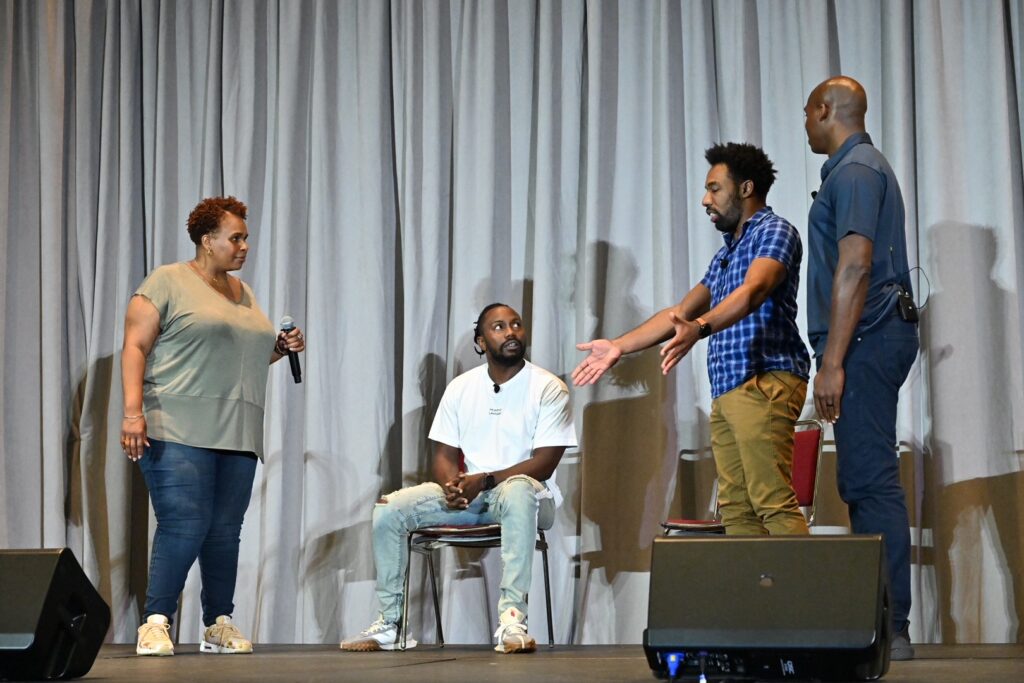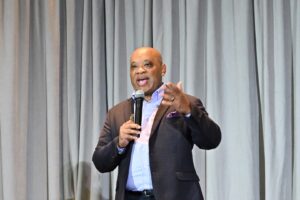
Can’t Tell Us Nothing improv group
What do you do about a co-worker who brings smelly fish for lunch every day, or is so into cats that they invite you to their cat’s birthday party, or the colleague who talks about “hollering” at their clients despite having the highest sales record? These are just some of the humorous but oh-so-real scenarios that Can’t Tell Us Nothing, a comedy improv group out of Houston, enacted during Glen Guyton’s MennoCon23 seminar, “IMPROVe Your Cultural Competency.”

Glen Guyton
“Sometimes, when we’re interacting with people different from us, we don’t know what to say. It can get weird. It can get awkward,” said Guyton, a professional cultural competency navigator and executive director of Mennonite Church USA. “So, how do we develop the skills necessary for effective cross-cultural communication or communication that involves talking to people that are different from us?” he asked the large intergenerational audience. “The only way that we could get better is if we practice.”
Guyton prefaced the seminar by saying, “The purpose of this is not to create division or conflict, but yes, you may be a little bit uncomfortable. And that’s okay.” He said that the seminar is a “brave space,” explaining that a “brave space means that you’re willing to take risks and ask questions … and put yourself out there even if it’s uncomfortable. We’re here to grow.”
Everyone has a cultural communications style that shapes our delivery and expectations, Guyton said.
“When I say things to you, you don’t hear it always in a way that is intended to be heard. You hear it in the way that you are shaped and formed. You shape it. You hear what I say through your lens of your experience. That’s why communication can be so challenging,” he explained.
“You have to ask yourself, what is your style, what’s your style of communication? What has shaped you what has formed the way that you hear, understand and see the world?” Guyton continued.
The seminar included several skits by Can’t Tell Us Nothing that introduced typical workplace situations in a light-hearted way. Guyton engaged the audience by asking for their observations of how the situation was handled and for additional suggestions.
The first skit featured a group of coworkers addressing workplace dilemmas, such as how to address the colleague who brings aromatic fish to work each day for lunch. When his coworkers asked questions about his lunch, the worker explains that his family is pescatarian and that his wife makes his lunch with love every day.”
Guyton encouraged audience members to be nonjudgmental, curious about cultural differences and upfront about expectations.
“It was really interesting to see it play out. I could relate,” said Bryn Yoder, a youth attendee from Berlin (Ohio) Mennonite Church in Ohio. “Even in high school … I can see things like that happening. I thought it was interesting how he said to talk about it and learn more information about it before you make an assumption about it being a bad experience.”
Other skits addressed things such as how to understand disabilities, especially ones that are not clearly visible, and the use of language in the workplace, emphasizing that what may be acceptable for one group of people may not be understood by another. Guyton emphasized that understanding context is important, especially for members of the dominant culture. He noted that BIPOC are often required to “code shift” to avoid barriers in dominant-populated spaces.
“We’ve established ways of doing business and ways of hosting meetings that fit a certain paradigm in many of our communities,” he said. “We may have to loosen the reins a little bit, change the language we use or change the flow of events in order to be more productive in new communities.”

